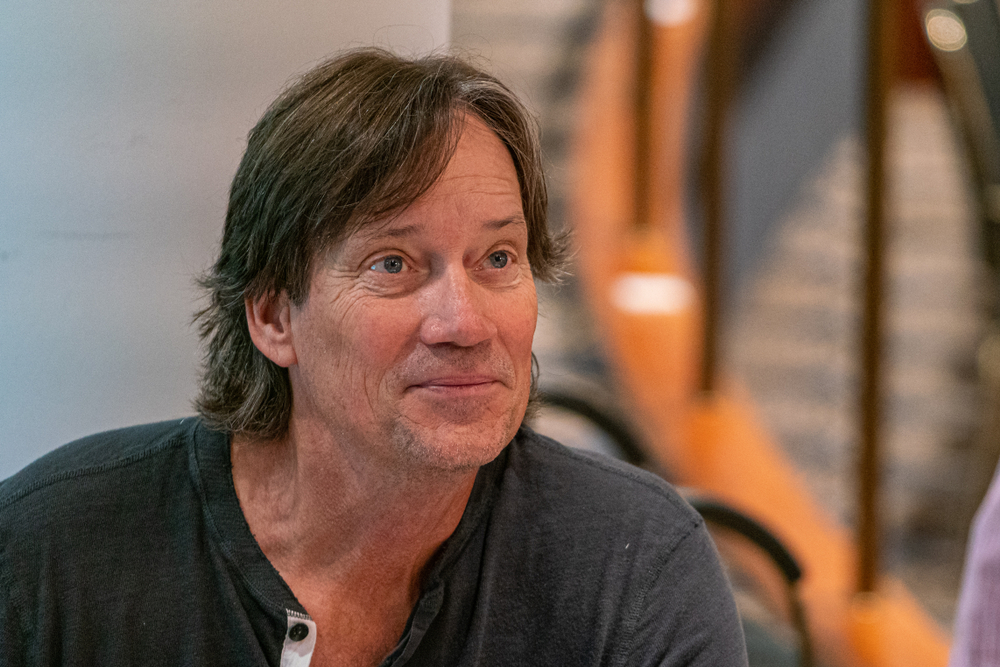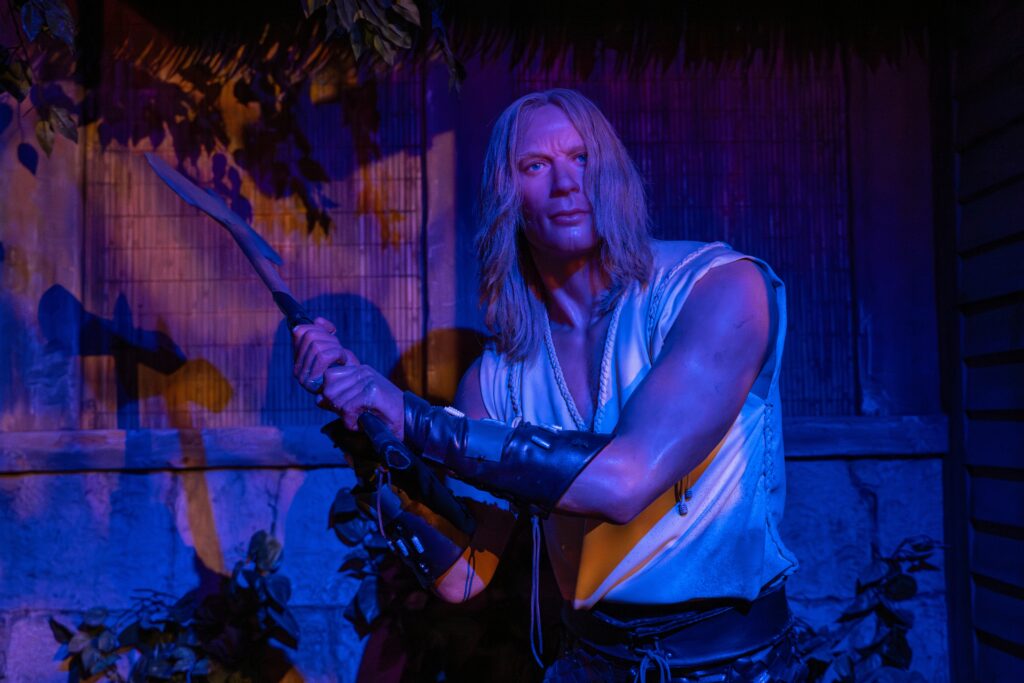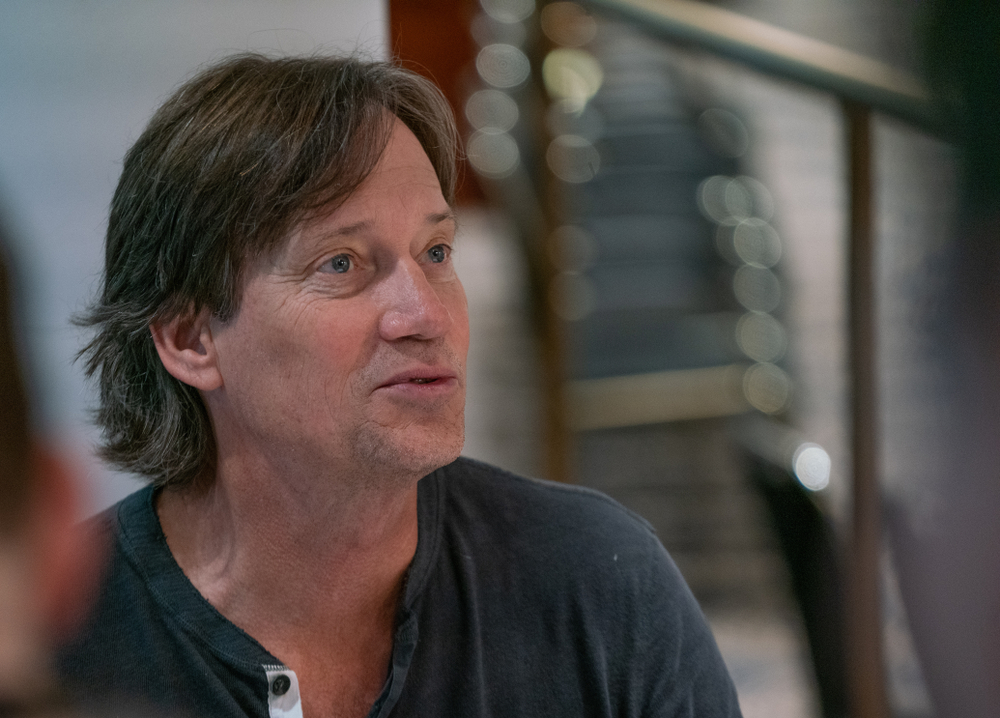Activism
Kevin Sorbo Under Fire After Claiming Hollywood Men Aren’t ‘Manly’ Anymore

Kevin Sorbo, celebrated for his role as Hercules, recently criticized Hollywood’s depiction of masculinity, claiming that today’s male leads lack the “manliness” of their predecessors. His social media post quickly divided opinions, with some supporting his perspective on traditional ideals while others called his views outdated.
At the heart of the discussion is the evolving portrayal of masculinity in modern media. Today’s male protagonists often embody traits like emotional vulnerability and empathy, challenging the hyper-masculine archetypes of the past. Sorbo’s comments have reignited debates over how gender roles and ideals are reshaped in an ever-changing cultural landscape.
Reimagining Heroes for a New Era

Kevin Sorbo attributes the perceived decline of masculinity in Hollywood to factors such as “alcohol, drugs, video games, porn, and other entertainment,” though he has not provided evidence to support these claims. Despite this, his call for a resurgence of traditional male heroes has struck a chord with some. Sorbo emphasized the importance of role models for young boys, stating, “Boys, especially, need heroes. It’s part of why storytelling has been an essential part of culture throughout history, particularly through the medium of filmmaking in this generation.”
In Sorbo’s vision, Hollywood should focus on “good men: men who love their wives and children, protect them, fight for what’s right, and speak up for the powerless. Men who, above all, have overcome their own selfish desires and are free to put others first.” This traditional archetype of heroism aligns with his broader critique of modern portrayals of masculinity, calling for stories that celebrate strength, selflessness, and moral clarity.
While Sorbo’s advocacy for these values has resonated with some audiences, the rise of diverse storytelling offers a different perspective. Today’s heroes often reflect multifaceted identities, blending traditional traits with emotional depth and inclusivity. From strong female leads to characters who defy conventional gender norms, modern filmmaking is expanding the definition of heroism. Perhaps the future lies not in choosing between the old and the new but in embracing the richness of both, allowing heroes of all kinds to inspire audiences in different ways.
The Backlash
Kevin Sorbo’s comments faced swift criticism across social media, with many accusing him of clinging to outdated ideals of masculinity. Detractors argued that Hollywood’s evolving portrayal of men embraces emotional depth and individuality over rigid, traditional stereotypes. They highlighted how modern male characters reflect a broader, more inclusive understanding of identity, celebrating vulnerability as a strength rather than a weakness.
Critics also pointed out the irony of Sorbo’s stance, given that his portrayal of Hercules was itself a mythological exaggeration of masculinity rather than a reflection of nuanced, real-world traits. Some even suggested his remarks stemmed more from personal frustrations with Hollywood than a genuine critique of male representation. While a minority supported Sorbo’s views, arguing that modern male leads often lack the physical grit of past icons, even they acknowledged the overly simplistic nature of his claims. The polarized response underscores just how deeply masculinity continues to resonate—and divide—in contemporary culture.
Masculinity Through the Lens of Time
Kevin Sorbo’s critique of modern masculinity extends beyond Hollywood’s depiction of leading men to how fathers and traditional male figures are portrayed. He claims, “Fathers, in particular, have become the butt of every woke Hollywood jab, the bumbling, useless idiots who contribute nothing to their families or communities, but sacrifice themselves as objects of ridicule.” Sorbo argues that Hollywood’s portrayals have drifted too far from presenting men as role models, advocating instead for representations of “men we’d want our sons to emulate and daughters to date.”
Sorbo also took aim at modern fashion and its celebrated icons, including Timothée Chalamet, noting, “GQ’s 2019 best-dressed man, Timothée Chalamet, for example, often wears clothes that, well… let’s just say your grandfather wouldn’t have been caught dead dressed like Chalamet.” He also criticized the normalization of androgyny in male celebrities, stating, “Society today seriously misunderstands masculinity. On the one hand, we love to normalize androgynous, Billy Porter-type men who sport skirts and poofy dresses.” For Sorbo, such representations undermine the traditional ideals he believes should remain central to masculinity.
However, fashion trends and expressions of masculinity have long evolved with the times. Historical figures once embraced powdered wigs, lace collars, and elaborate dress, reflecting the norms of their eras. Sorbo’s nostalgia for traditional masculinity contrasts with the fluid and dynamic nature of its expression throughout history. Masculinity, much like fashion, has always been shaped by cultural and societal shifts, challenging fixed notions of what it means to be a man.
Hollywood’s Evolution: From Hercules to Human
Kevin Sorbo’s portrayal of Hercules in the 1990s cemented him as a symbol of traditional masculinity—a hero defined by “physical strength, unwavering confidence, and moral clarity.” For many, Sorbo’s Hercules epitomized the archetype of the strong, dependable male lead that dominated screens during that era. This legacy adds weight to his recent critique of Hollywood, where he champions a return to such ideals. However, critics argue that his perspective may be clouded by nostalgia for a time when his career thrived, rather than an impartial assessment of today’s entertainment landscape.
Since leaving mainstream Hollywood, Sorbo has shifted his focus to Christian-themed films and commentary on social and cultural issues. Some suggest this move reflects a growing disconnect from an industry that has embraced a broader spectrum of masculinity. Detractors have gone so far as to label his critiques an attempt to remain relevant, but his supporters counter that his experience as a leading man gives him a unique perspective on Hollywood’s evolving portrayal of male heroes.
This divide highlights the shift in what audiences seek from their protagonists. The hyper-masculine, infallible heroes of the past have given way to more complex characters who display vulnerability and emotional depth. While Sorbo’s remarks appeal to those nostalgic for traditional ideals, they also underscore the growing preference for relatable and multidimensional representations of masculinity in modern storytelling.
Balancing Tradition and Progress
Kevin Sorbo’s remarks have reignited the conversation about masculinity’s shifting ideals in today’s culture. Traits like stoicism, physical dominance, and emotional detachment once defined manhood, celebrated as cornerstones of traditional masculinity. In contrast, modern narratives are reshaping this identity, emphasizing emotional intelligence, authenticity, and inclusivity. Hollywood has mirrored this evolution, presenting male characters who balance vulnerability and moral complexity with strength, moving beyond rigid stereotypes.
For many, these changes represent a long-overdue cultural shift, challenging toxic norms that perpetuated harmful behaviors and limited self-expression. Characters who display emotional depth, like those seen in recent blockbusters, resonate with audiences seeking relatable and multidimensional heroes. However, critics argue that this evolution risks losing the qualities that once embodied resilience and strength, viewing the decline of hyper-masculine archetypes as a loss of tradition.
Sorbo’s critique encapsulates this divide, underscoring the broader societal tension between maintaining traditional ideals and embracing a more inclusive vision of masculinity. As Hollywood continues to redefine its male protagonists, the debate reflects an ongoing struggle to balance progress with the values of the past in a way that resonates with a diverse and ever-changing audience.
The Future of Masculinity: A Story Still Unfolding

The debate sparked by Kevin Sorbo’s remarks reflects a larger cultural reckoning with the meaning of masculinity in the modern era. While some champion the evolution of male representation as a step toward authenticity and inclusivity, others hold fast to traditional ideals they feel have been unfairly discarded. Hollywood, as both a mirror and a driver of societal values, sits at the heart of this ongoing conversation.
As society continues to navigate these shifting dynamics, it’s clear that the definition of manhood is no longer a singular narrative but a tapestry of diverse experiences and expressions. Whether rooted in nostalgia or driven by progress, the discussion reveals one unchanging truth: masculinity, like all aspects of culture, will keep evolving—reflecting the complexities, struggles, and aspirations of each generation.
Activism
Prayers Are Needed for Steve Irwin’s Daughter Bindi. She Is on Her Way to Recovery but Prayers Will Help a Lot

Bindi Irwin, celebrated for her dedication to wildlife conservation and carrying on her father Steve Irwin’s legacy, is no stranger to facing challenges in the public eye. From working with dangerous animals to maintaining her family’s work, she has always shown strength. Yet, behind her contagious smile and commitment to the natural world, Bindi has quietly been fighting a personal health battle, away from the limelight, for over ten years.
Recently, Bindi revealed her struggle with a condition that affects millions of women. This courageous step not only exposed the reality of her own experience but also opened up critical discussions about a topic that often remains misunderstood.
As she continues her journey to recovery, Bindi’s story has become one of hope and resilience. It’s a powerful reminder of the importance of raising awareness and advocating for those who suffer in silence. So, what has this journey been like for her, and how has it shaped the person she is today?
Bindi’s Ten-Year Battle for Diagnosis
For over a decade, Bindi Irwin quietly endured overwhelming pain, fatigue, and nausea, all without knowing the real cause. Like many women, her symptoms were brushed off by doctors, with some telling her that the pain was just “part of being a woman.” One doctor even told her to simply “deal with it.” These dismissals left her struggling not just physically but emotionally, as she was left without answers and continued suffering.
Bindi didn’t give up, though. She underwent numerous tests for everything from tropical diseases to cancer, but nothing explained her pain. It wasn’t until a close friend encouraged her to see a specialist that she finally found some clarity. In 2022, after another intense episode of pain left her curled up in a fetal position, Bindi had a laparoscopy—an important procedure that allows doctors to get a clearer look inside the abdomen. What they found was shocking: 37 lesions, some deeply embedded, and a “chocolate cyst” on one of her ovaries.
Hearing her doctor say, “How did you manage to live with this much pain?” was a moment of validation. Finally, she had the answers she had been seeking for so long. Sadly, Bindi’s story isn’t unique—many women with endometriosis face years of being ignored or misdiagnosed before getting proper help.
How Endometriosis Affected Bindi’s Life and Career
Bindi Irwin’s battle with endometriosis didn’t just cause physical pain—it impacted every aspect of her life. For more than ten years, she dealt with exhaustion, constant discomfort, and nausea. Despite these struggles, she continued her work as a conservationist, public figure, and a new mom to her daughter, Grace. But behind the scenes, things were far more difficult than most people knew. As Bindi once said, “Every part of my life was being torn apart because of the pain.”
The symptoms of endometriosis—like severe pelvic pain, painful periods, and fatigue—were always present, making it hard for her to keep up with her busy career. Her days at Australia Zoo, where she works alongside her family, became more challenging as she struggled to manage both her work and her health. Even simple social events had to be put on hold, as she funneled every bit of energy into just getting through each day. This invisible battle made it difficult for others to truly understand how much she was suffering.
Beyond the physical toll, the emotional burden was just as heavy. Like many women with chronic conditions, Bindi often felt isolated and frustrated by the lack of understanding from the medical community. One doctor even told her to “just deal with it,” a common experience for women whose pain is often dismissed.
Bindi’s story mirrors the experiences of many women dealing with endometriosis—struggling in silence while trying to maintain their personal and professional lives. It’s not just a physical condition; it affects your entire world.
Speaking Up: Turning Pain Into Purpose
After years of silently struggling, Bindi Irwin made the courageous choice to open up about her experience with endometriosis. In March 2023, just after her surgery, she shared her story on social media, letting the world in on her personal battle. Her message was heartfelt and honest, connecting deeply with women who had faced similar challenges. “There’s a stigma around this awful disease,” Bindi wrote. “I’m sharing my story for anyone who’s quietly dealing with pain and still searching for answers.”
By speaking out, Bindi didn’t just shed light on her own pain—she highlighted an issue that affects millions of women but often goes unnoticed. Endometriosis is more than just bad cramps; it’s a condition that can take over your life. Bindi’s openness helped start important conversations about how we need better education, awareness, and support for those dealing with this condition.
When Bindi received the Endometriosis Foundation of America’s Blossom Award, she made her mission clear: “I’ll spend the rest of my life raising awareness and helping others who are fighting this same battle.” Her willingness to speak up has given a voice to so many who feel overlooked or misunderstood.
Bindi’s story is a powerful reminder that sometimes, sharing your pain can help others find their own strength. She’s not just fighting for herself—she’s fighting for every woman who’s been told her pain doesn’t matter.
Coping with Endometriosis

Dealing with endometriosis is tough, but there are little things you can do to make life more manageable. Sometimes it’s as simple as taking a break to breathe deeply or stretch. Even a few minutes of calm can help ease stress, which often makes the pain worse. Writing down how you feel each day can also be helpful—it lets you spot patterns and helps your doctor find better ways to treat your symptoms.
Moving your body, even if it’s just taking a short walk or doing some light stretching, can help a lot. It gets your blood flowing and can make you feel a bit better. Eating more fresh foods—like fruits, veggies, and whole grains—may also lower inflammation, which could ease some of the symptoms. And on those really rough days, using a heating pad or soaking in a warm bath can bring quick relief.
But above all, don’t go through this alone. Talk to someone—a friend, a family member, or even a support group. Just having people around who understand what you’re going through can make a huge difference when things get hard.
Bindi’s Journey of Healing and Advocacy
Bindi Irwin’s journey with endometriosis is a story of strength and determination. After years of quietly enduring pain, she’s now using her experience to help others. By opening up about what she’s been through, Bindi is giving a voice to so many women who’ve felt ignored or brushed aside. Her message is clear: your pain is real, and it deserves to be taken seriously.
Bindi’s honesty is already making a difference. She’s sparking conversations that are much needed, shining a light on how often women’s health issues get overlooked. And she’s showing that speaking up can lead to real change—not just for herself, but for so many others.
As Bindi moves forward, she’s balancing her life as a mom, a conservationist, and now, an advocate for women’s health. Her story is a reminder that, even when things seem impossible, there’s always hope. By sharing her journey, she’s letting others know they’re not alone and that better days are ahead. No matter how tough the fight, Bindi’s courage shows us that healing is possible, and there’s always hope on the horizon.
Awareness
11 Things You Really Need to Stop Recycling

(TMU Op-Ed) — Since most of us were kids we’ve heard the phrase Reduce, Reuse, Recycle repeated ad nauseam everywhere from on TV to ads plastered on the sides of buses, on recycling bins, on coloring pages, and a host of other places.
However, over the years it seems something was lost in translation. With less focus placed on reducing and reusing, our recycling bins are overflowing week after week. Sure, it might be better to have an overflowing recycling bin than it is to have an overflowing trash bin, but how much better is it really?
At the same time we’re finally seeing an increase of recycling outside of the home at places like schools, gas stations, airports, etc. we’re also seeing a dramatic cutting back of the acceptance of recyclables created in the United States. China recently started restricting the import of recyclable waste including mixed paper and most plastics. The news of this happening was the first time that many people in the United States became aware that a lot of our recycling isn’t actually recycled here. For an act billed as a necessity to saving the environment, the fact that it uses an overwhelming amount of time and resources including fuel to ship it overseas is a little concerning.
But more than that, recycling is only a thing because recyclables are valuable. According to a press release, “The global waste management market size is expected to reach $484.9 billion by 2025.” This means that when you toss something into your recycling bin and it is not able to turn a profit it won’t be recycled. Unfortunately this isn’t rare.
Then there’s also the people that are too hopeful about the abilities of the recycling industry and as a result they toss everything in the bin regardless of what the code on the bottom of the item says or what their local rules say. It only takes a little bit of the wrong thing from a “wishful” recycler to ruin an entire batch of recyclable material. And this too isn’t rare. In fact, according to Waste Management one out of every four items that ends up in recycling bins doesn’t actually belong there.
Here are 11 things that “wishful” recyclers tend to toss in the bin:
- Plastic Bags — To some it may be common knowledge that plastic shopping bags, bubble wrap, cereal bags, food wrap, and more cannot be recycled in your home bin but they still find their way into municipal recycling facilities far too often. These bags can clog up machines and workers must remove them by hand. Thankfully plastic bags are accepted at many stores including local co-ops and chains like Target and Trader Joes.
- Receipts — Unfortunately, most receipts that you receive while shopping are coated in Bisphenol A (BPA). While yes they are paper, the fact that they are coated in BPA means that it contaminates the paper product being made when they get mixed in with the pulp. If you don’t need a receipt just decline it at the store since you can’t recycle it and more importantly because the BPA coating comes off onto your hands and other surfaces. This is especially important information for parents who often hand receipts off to antsy kids during shopping trips. Skip the receipts if you can and if you can’t be sure to wash your hands after handling them.
- Pizza Boxes — Takeout and delivery pizza boxes can’t be recycled, despite their obvious cardboard construction. Any paper product with even the smallest amount of food strains cannot be recycled and this always includes pizza boxes. Thankfully many pizza boxes are now made to be compostable and will say so on the box but remember: compostable does not equal recyclable.
- Bits of Food — Just because you can recycle something doesn’t mean you can recycle it dirty. Rinse out glass and plastic before tossing it in the bin and if the container is still greasy use some soap and water. Even a little bit of food can ruin an entire load of recycling.
- Coffee Cups — Even the greenest among us find ourselves out and about without our own cup when we crave a cup of coffee. Unfortunately, while those cups are paper, they’re lined with plastic film to keep the liquid from soaking into and then out of it which makes them impossible to recycle. The lids and the paper sleeves are recyclable but the cups never are. Next time you’re out without your own reusable cup, ask the barista for a “here” cup and finish your drink before leaving.
- Wrapping Paper — Some municipalities accept wrapping paper but it is important to check your local rules. However, the popular shiny and metallic papers are never recyclable. If you are able to recycle basic, matte wrapping paper be sure to remove ribbons and bows. In lieu of using store bought gift wrap, try transitioning into using newspaper, paper bags, or the brown paper that sometimes comes inside of shipping packages.
- Shredded Paper — There are good reasons to shred certain documents at home but unless you compost it’s better to stick to shredding only that which must be shredded because recycling centers just can’t handle those tiny strips of paper. In fact they can clog up the equipment because they’re so small! Thankfully shredded paper can be composted but make sure not to include envelopes with plastic windows or anything else that isn’t paper. However, some municipalities will accept shredded paper but only if it’s placed in a paper bag and stapled close so please check your local rules for this one.
- Broken Things — Broken plates and glass shouldn’t be placed in your recycling for various reasons. One of the biggest is that they pose a hazard to sanitation workers. If you have broken items wrap them in plastic and carefully put them in the trash.
- Old Dishes — Plates and glassware are not recyclable. If you have items that are in good condition take them to a thrift store instead of throwing them away. Bakeware has a much different melting point and chemical composition than normal recyclable glass.
- Bits of Metal — Some things are too small to recycle. Just like how a piece of paper is recyclable but shredded paper is not, the tab from a metal can isn’t recyclable by itself even though an entire can is. And it’s for the same reason—these small things can clog up the machinery and slow down the entire recycling process. If a soda can tab does fall off, place it inside the can when you’re done. If you have little bits of tinfoil, keep it somewhere safe and add to it until it becomes a big ball.
- Food Boxes and Containers — Most freezer food boxes are coated in plastic, much like coffee cups. And just like coffee cups it makes these otherwise paper products not recyclable. Unfortunately this is the same for cartons that contain nut milk, oat milk, juice, soups, and more. Some municipalities currently accept these cartons but it is not the norm. You can find out more about how to recycle those containers here.
Remember: when in doubt, throw it out. It’s better to mistakenly throw something away that could be recycled than be an aspirational recycler and ruin an entire truck load of recycling. And always check with your local municipality at least once a year to stay up to date on the rules where you live.
Reduce, reuse, recycle—in that order.
-

 Awareness6 days ago
Awareness6 days agoMarathon runner diagnosed with terminal cancer urges people not to dismiss small symptom he experienced
-

 News2 weeks ago
News2 weeks ago9 Eerie Stories Of Third Man Syndrome, When People Claimed An Unseen Presence Helped Them Survive A Disaster
-

 Entertainment2 weeks ago
Entertainment2 weeks agoJames Franco Explained How Life Is Now Different After Being ‘Cast Out’ of Hollywood
-

 Awareness2 weeks ago
Awareness2 weeks ago‘Bleeding Eye’ Virus Sparks Travel Warning and Worldwide Concern – What Is the Incurable Disease?




